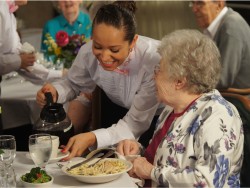
by Cindy Heilman | Build Communities of Belonging, Leadership, Resident Centered Dining Service, Retain Staff

Many friendships are formed and carried through long periods over the lunch/dinner table. ‘Let’s meet for lunch’ is a common phrase that indicates wanting to spend some time with a friend.
It’s nice to have lunch served to you but it’s the friendship that is the magnet. Even casual friendships are important to us. To share a meal with a friend, or potential friend, is a bonding moment. To hold business meetings over lunch forms friendships that break down barriers and continue to work long after the meal is finished and the table is cleared.
Forming friendships on the job is a vital part of having a smoother workday. We all know there are days when everything goes wrong.
Now picture going to that friend at work who is the very one to help you solve a problem and put you back on track. Friends who have been on the job years longer than you, can give you tips on how to do your work easier, with intention.
Sometimes a friend is like having an extra pair of hands. On the other hand, it is just as gratifying when you can be the friend to help your coworker. There is a particular feeling of attachment in your gut when you have extended yourself to help another.
There is a spring in your step as you prepare to go to work because you know you will see friends to greet you, exchange the latest news, and bring you up to date on any events.
Having kindness about you is beneficial when working in a senior or assisted living where you will be helping residents in one way or another. That same kind of attitude is an invitation to your coworkers for friendship. You all share the same work reality and that is powerful in forming friendships on the job.
It is easier to understand a dilemma that arises and discussing it is uncomplicated when you know you are all immersed in the same field. That also applies when you want to share happy news or accomplishments.
Who could better share the joy than someone who knows the situation? Your coworkers seek the same goals you do for the residents. When issues are shared it builds a better working relationship.
Unexpected friendships in the community create strength and a positive growth of self.
Kind Dining® training sessions open the doors for these friendships to form. Discussion and alliance as a team at work are encouraged.
Be ♥ Kind Tip: Friendships with coworkers create strength and a positive growth of self.

by Cindy Heilman | Leadership
 My friend Alice told me about meeting with a long-time friend recently. Knowing my Kind Dining® beliefs and dedication to senior retirement communities, she thought of me as the conversation unfolded. “My girlfriend brought me up to date on the small hotel business she and her husband bought in a small town, two years ago.” She said, “They both had experience in that industry but were shifting their work time to other things they loved to do. Now in midlife, he’s an artist and she’s a writer so they didn’t want to spend masses of time in the hotel every day.
My friend Alice told me about meeting with a long-time friend recently. Knowing my Kind Dining® beliefs and dedication to senior retirement communities, she thought of me as the conversation unfolded. “My girlfriend brought me up to date on the small hotel business she and her husband bought in a small town, two years ago.” She said, “They both had experience in that industry but were shifting their work time to other things they loved to do. Now in midlife, he’s an artist and she’s a writer so they didn’t want to spend masses of time in the hotel every day.
Most of the staff had been with the hotel for years and could practically run it on their own. She said that one of the surprises they didn’t expect was how the hotel dining room brought in a large portion of income. “At first, the dining room was the only area of the hotel that fell below par when they took the hotel over. They asked friends who the staff would not recognize, to dine there and give them an honest assessment on what needed to be improved. Then they got down to making changes starting with discussions with the chef, taking note of his enthusiasm but lack of adventure because the former owners would not allow him to stretch his talents. We saw a definite change in his demeanor when we gave him full control and responsibility of menus and his prepping cooks. He had all these wonderful ideas tucked inside him waiting to let them loose!
“Then we gathered the wait staff for a meeting hour between lunch and dinner. We introduced training exercises showing them how we wanted them to perform and teaching them what results could be expected. We also handed them the opportunity for living hospitality, giving them our interpretation of what it is and how to attain it. We encouraged them to notice what improvements they would like to see happen, promising a meeting twice a month to discuss whatever they wanted to talk about in regards to the dining room. Only one person was grumpy. We decided to give him some time to acclimate since he was a long time employee. It was clear though, that it was his obligation to make the effort.”
Alice recalled that they spent time in the beginning reinforcing their new goals for their employees and were on hand to encourage the staff with their presence. But once the food servers worked as a team, it all smoothed out. Allowing the chef to incorporate his ideas turned the dining room into a well-received restaurant. As the restaurant became popular, people booked their rooms for entire weekends. Who would have thought the dining room had the power to make a tremendous success for the entire hotel? While a small hotel is not a retirement community, the basics are the same and the results could be also.
Our B♥ Kind ® Tip: Remember, hospitality is an attitude of caring.




 My friend Alice told me about meeting with a long-time friend recently. Knowing my Kind Dining® beliefs and dedication to senior retirement communities, she thought of me as the conversation unfolded. “My girlfriend brought me up to date on the small hotel business she and her husband bought in a small town, two years ago.” She said, “They both had experience in that industry but were shifting their work time to other things they loved to do. Now in midlife, he’s an artist and she’s a writer so they didn’t want to spend masses of time in the hotel every day.
My friend Alice told me about meeting with a long-time friend recently. Knowing my Kind Dining® beliefs and dedication to senior retirement communities, she thought of me as the conversation unfolded. “My girlfriend brought me up to date on the small hotel business she and her husband bought in a small town, two years ago.” She said, “They both had experience in that industry but were shifting their work time to other things they loved to do. Now in midlife, he’s an artist and she’s a writer so they didn’t want to spend masses of time in the hotel every day.